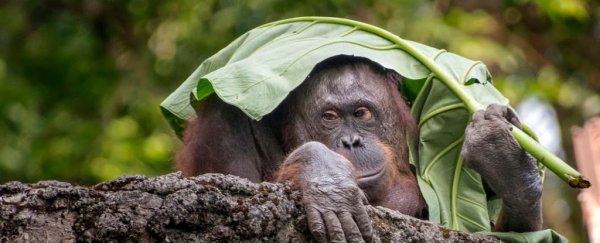Dogs, cats, or goldfish probably can't have conversations with each other about times long gone by – it's a feature we've thought was pretty much exclusive to humans.
But a recent study is shaking up that idea, showing that orangutan mothers wait on average seven minutes after a potential predator is out of sight, before sounding the alarm to warn others.
"The results are quite surprising," Carel van Schaik, a primatologist at the University of Zurich in Switzerland who was not involved in the work, said to Science Magazine back in November.
Orangutans have quite a specific alarm call – it sounds kind of like a human kiss noise. Scientists think it helps warn others about danger, but if it's used, it might also inform the predator that it's been spotted.
The team set out to investigate whether these alarm calls involved any displaced reference - which the team explains is "the capacity to transmit information about something that is not present or about a past or future event".
In the depths of Sumatra's Ketambe forest, the team began their experiments by donning coloured sheets and crawling on the ground below seven mother orangutans.
The scientists ambled around in either a white, spotted, patterned, or tiger-stripe coloured sheet for two minutes, while the mother would sit in the tree above.
We can't help but laugh at the idea of this, but it got the job done. All in all half of the encounters were rewarded with a kiss vocalisation.
 (Adriano R. Lameira)
(Adriano R. Lameira)
The tiger-stripe and patterned sheet got most of these responses, but they found only one of the vocalisations occurred when the 'predator' was still visible.
The rest were delayed, on average seven minutes after the perceived threat was gone, but up to 20 minutes in the case of one particular older female orangutan.
"She stopped what she was doing, grabbed her infant, defecated [a sign of distress], and started slowly climbing higher in the tree," Adriano Reis e Lameira, one of the researchers, explained to Science Magazine. "She was completely quiet."
"Twenty minutes passed. And then she finally did it."
But then once she started, "she called for more than an hour," he added.
There could be other reasons - not ones to do with displaced reference - why the orangutans were waiting, such as being petrified with fear, but the researchers don't think this is the case.
Instead, the team thinks the mothers might have been waiting to protect their child.
"Vocal delay was also a function of perceived danger for another - an infant - suggesting high-order cognition," they write in the study.
"Our findings suggest that displaced reference in language is likely to have originally piggybacked on akin behaviours in an ancestral hominid."
This means that our ability to understand and vocalise about the past may have evolved from an ancient hominid relating to both humans and orangutans.
Now this is a big claim, and future research will have to back this up before we rewrite any textbooks.
But it's not the first time orangutans have shown impressive intelligence, and the more we know about these creatures, the more we'll understand about the history and evolution of our own language abilities.
The research was published in Science Advances.
A version of this article was first published in November 2018.
